

Tragic hero. A tragic hero (or tragic heroine, if a woman) is the protagonist of a tragedy.
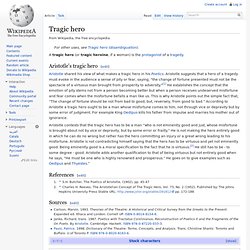
Aristotle's tragic hero[edit] Aristotle contests that the tragic hero has to be a man “who is not eminently good and just, whose misfortune is brought about not by vice or depravity, but by some error or frailty.” He is not making the hero entirely good in which he can do no wrong but rather has the hero committing an injury or a great wrong leading to his misfortune. Aristotle is not contradicting himself saying that the hero has to be virtuous and yet not eminently good. Being eminently good is a moral specification to the fact that he is virtuous.[2] He still has to be - to some degree - good. References[edit] Jump up ^ S.H. Sources[edit] Carlson, Marvin. 1993.
The School of Athens. The School of Athens, or Scuola di Atene in Italian, is one of the most famous frescoes by the Italian Renaissance artist Raphael.
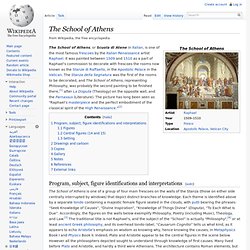
Democracy. According to political scientist Larry Diamond, it consists of four key elements: The term originates from the Greek δημοκρατία (dēmokratía) "rule of the people",[4] which was found from δῆμος (dêmos) "people" and κράτος (krátos) "power" or "rule", in the 5th century BC to denote the political systems then existing in Greek city-states, notably Athens; the term is an antonym to ἀριστοκρατία (aristokratía) "rule of an elite".

While theoretically these definitions are in opposition, in practice the distinction has been blurred historically.[5] The political system of Classical Athens, for example, granted democratic citizenship to an elite class of free men and excluded slaves and women from political participation. Democracy contrasts with forms of government where power is either held by an individual, as in an absolute monarchy, or where power is held by a small number of individuals, as in an oligarchy. Characteristics[edit] History[edit] Ancient origins[edit] Middle Ages[edit] Robert A. Juno (mythology) Juno's own warlike aspect among the Romans is apparent in her attire.
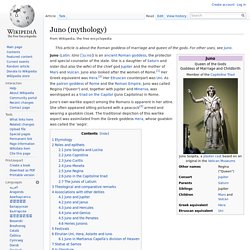
She often appeared sitting pictured with a peacock[3] armed and wearing a goatskin cloak. The traditional depiction of this warlike aspect was assimilated from the Greek goddess Hera, whose goatskin was called the 'aegis'. The name Juno was also once thought to be connected to Iove (Jove), originally as Diuno and Diove from *Diovona.[4] At the beginning of the 20th century, a derivation was proposed from iuven- (as in Latin iuvenis, "youth"), through a syncopated form iūn- (as in iūnix, "heifer", and iūnior, "younger"). This etymology became widely accepted after it was endorsed by Georg Wissowa.[5] Juno's theology is one of the most complex and disputed issues in Roman religion. Nero. Nero (/ˈnɪəroʊ/; Latin: Nero Claudius Caesar Augustus Germanicus;[1] 15 December 37 – 9 June 68)[2] was Roman Emperor from 54 to 68, and the last in the Julio-Claudian dynasty.
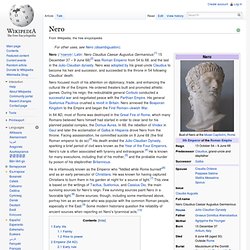
Nero was adopted by his great-uncle Claudius to become his heir and successor, and succeeded to the throne in 54 following Claudius' death. Nero focused much of his attention on diplomacy, trade, and enhancing the cultural life of the Empire. He ordered theaters built and promoted athletic games. During his reign, the redoubtable general Corbulo conducted a successful war and negotiated peace with the Parthian Empire. His general Suetonius Paulinus crushed a revolt in Britain. Epicureanism. Epicureanism is a system of philosophy based upon the teachings of Epicurus, founded around 307 BC.
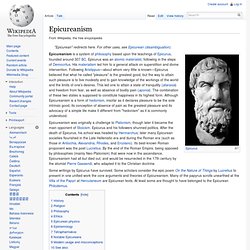
Epicurus was an atomic materialist, following in the steps of Democritus. His materialism led him to a general attack on superstition and divine intervention. Following Aristippus—about whom very little is known—Epicurus believed that what he called "pleasure" is the greatest good, but the way to attain such pleasure is to live modestly and to gain knowledge of the workings of the world and the limits of one's desires. This led one to attain a state of tranquility (ataraxia) and freedom from fear, as well as absence of bodily pain (aponia). The combination of these two states is supposed to constitute happiness in its highest form. Epicureanism was originally a challenge to Platonism, though later it became the main opponent of Stoicism. Some writings by Epicurus have survived. Apatheia. Pain is slight if opinion has added nothing to it; ... in thinking it slight, you will make it slight.
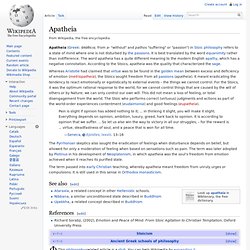
Everything depends on opinion; ambition, luxury, greed, hark back to opinion. It is according to opinion that we suffer. ... Ascanius. Mythology[edit] In Greek and Roman mythology, Ascanius was the son of the Trojan prince Aeneas and Creusa, daughter of Priam.
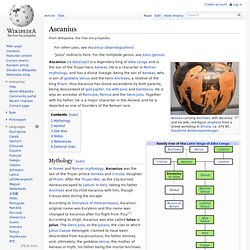
After the Trojan War, as the city burned, Aeneas escaped to Latium in Italy, taking his father Anchises and his child Ascanius with him, though Creusa died during the escape. According to another legend mentioned by Livy, Ascanius may have been the son of Aeneas and Lavinia and thus born in Latium, not Troy. Ascanius later fought in the Italian Wars along with his father Aeneas. Pietas. Pietas, as a virtue of the emperor Antoninus Pius, represented by a woman offering a sacrifice on the reverse of this sestertius.
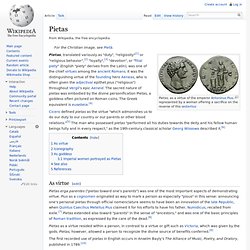
Homeric simile. Homeric simile, also called an epic simile is a detailed comparison in the form of a simile that is many lines in length.

The word "Homeric" is based on the Greek author, Homer, who composed the two famous Greek epics, the Iliad and the Odyssey. Many authors continue to use this type of simile in their writings. Pax Romana. Extent of the Roman Empire under Augustus. Yellow represents the extent of the Republic in 31 BC, while green represents gradually conquered territories under the reign of Augustus, and pink areas represent client states. Pax Romana (Latin for "Roman peace") was the long period of relative peace and minimal expansion by military force experienced by the Roman Empire in the 1st and 2nd centuries AD. Since it was established by Augustus, it is sometimes called Pax Augusta. Its span was approximately 206 years (27 BC to 180 AD).[1]
Veni, vidi, vici. Dido (Queen of Carthage) Aeneas recounting the Trojan War to Dido, a painting by Pierre-Narcisse Guérin. This scene is taken from Virgil's Aeneid, where Dido falls in love with, only to be left by, the Trojan hero Aeneas. Dido (/ˈdaɪdoʊ/ DY-doh) was, according to ancient Greek and Roman sources, the founder and first Queen of Carthage (in modern-day Tunisia). She is best known from the account given by the Roman poet Virgil in his Aeneid. In some sources she is also known as Elissa (/iːˈlɪsə/ ee-LISS-ə).
Hannibal. Hannibal lived during a period of great tension in the Mediterranean, when the Roman Republic established its supremacy over other great powers such as Carthage, the Hellenistic kingdoms of Macedon, Syracuse, and the Seleucid empire. One of his most famous achievements was at the outbreak of the Second Punic War, when he marched an army, which included war elephants, from Iberia over the Pyrenees and the Alps into northern Italy. In his first few years in Italy, he won three dramatic victories—Trebia, Trasimene, and Cannae, in which he distinguished himself for his ability to determine his and his opponent's strengths and weaknesses, and to play the battle to his strengths and the enemy's weaknesses—and won over many allies of Rome. Hannibal occupied much of Italy for 15 years, but a Roman counter-invasion of North Africa forced him to return to Carthage, where he was decisively defeated by Scipio Africanus at the Battle of Zama.
Background and early career[edit] Punic Wars. Background Depiction of Hannibal and his army crossing the Alps during the Second Punic War. During the mid-3rd century BC, Carthage was a large city located on the coast of modern Tunisia. Founded by the Phoenicians in the mid-9th century BC, it was a powerful thalassocratic city-state with a vast commercial network. Rosetta Stone. Ever since its rediscovery, the stone has been the focus of nationalist rivalries, including its transfer from French to British possession during the Napoleonic Wars, a long-running dispute over the relative value of Young and Champollion's contributions to the decipherment, and since 2003, demands for the stone's return to Egypt.
Description[edit] Original stele[edit] Tanakh. Rosetta Stone. Four causes. Four Causes refers to an influential principle in Aristotelian thought whereby causes of change or movement are categorized into four fundamental types of answer to the question "why? ". Aristotle wrote that "we do not have knowledge of a thing until we have grasped its why, that is to say, its cause. "[1][2] While there are cases where identifying a cause is difficult, or in which causes might merge, Aristotle was convinced that his four causes provided an analytical scheme of general applicability.[3] Aristotle held that there were four kinds of causes:[2][4] Telos (philosophy) Telos (philosophy) The Republic (Plato) Theory of Forms. Plato's theory of Forms or theory of Ideas[1][2][3] asserts that non-material abstract (but substantial) forms (or ideas), and not the material world of change known to us through sensation, possess the highest and most fundamental kind of reality.[4] When used in this sense, the word form or idea is often capitalized.[5] Plato speaks of these entities only through the characters (primarily Socrates) of his dialogues who sometimes suggest that these Forms are the only true objects of study that can provide us with genuine knowledge; thus even apart from the very controversial status of the theory, Plato's own views are much in doubt.[6] Plato spoke of Forms in formulating a possible solution to the problem of universals.
Fertile Crescent. Fertile Crescent. Apology (Plato) Creon. Peloponnesian War. The Peloponnesian War (431–404 BC) was an ancient Greek war fought by Athens and its empire against the Peloponnesian League led by Sparta. Civilization. Ancient Egypt is a canonical example of an early culture considered a civilization. Civilization or civilisation (in British English) generally refers to state polities which combine these basic institutions, having one or more of each: a ceremonial centre (a formal gathering place for social and cultural activities), a system of writing, and a city. The term is used to contrast with other types of communities including hunter-gatherers, nomadic pastoralists and tribal villages.
Hubris. Hubris (/ˈhjuːbrɪs/, also hybris, from ancient Greek ὕβρις), means extreme pride or self-confidence. Socratic method. Homer. Sophist. Catharsis. Tragic hero. Academy. Tragedy. Mycenae. Allegory of the Cave. Dithyramb. Minoan civilization.